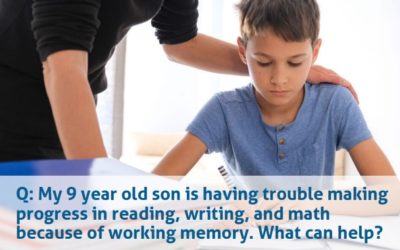It's important to be aware that although many dyslexics have natural strengths in math reasoning and scientific thinking, these strengths may not be evident during K-12 education because of challenges with symbol confusion and polysemous or multiple meaning words in...
What Can Help with Working Memory Limitations?
Q: My 9 year old son is having trouble making progress in reading, writing, and Math because of working memory. What can help? Working memory is a type of memory that allows us to temporarily hold information 'in mind' to be used for other cognitive tasks. Some people...
Are There Any Group Activities That Benefit Dyslexic Students? [Premium]
Like non-dyslexic students, there can be a wide variations that exist between how students enjoy group activities. In general, extroverts love group activities, while introverts less so. But there are benefits from the selection of some activities that especially benefit dyslexic students. CREATE A POSITIVE CLASSROOM CULTURE FOR DIFFERENT LEARNERS First of all, it’s helpful to have a classroom culture that allows flexibility in learning and accepting of differences. Students can be encouraged to take a different approach while solving problems and demonstrating knowledge. A discussion about differences in learning at the beginning of the year can make students who know they learn differently, feel more welcome. Some teachers may also model their openness to solving problems or learning a different way. Offering students options […]
What is ‘Explicit’ Instruction and Why Does It Help with Dyslexia? [Premium]
If you look at almost any evidence-based guidelines for students with dyslexia, you’ll see the word ‘explicit’ in how instruction is delivered. Merriam’s Dictionary defines explicit as: “fully revealed or expressed without vagueness, implication, or ambiguity; leaving no question as to meaning or intent.” WHY IS EXPLICIT INSTRUCTION FOR DYSLEXIC STUDENTS? Remember that people with dyslexia tend to store information in explicit or declarative memory – with episodic memory areas being especially active. Activities that non-dyslexic people seem to acquire more effortlessly – like recognizing printed words, writing by hand, or retrieving math facts – are difficult if not impossible to learn without explicit instruction. For example, many non-dyslexic people may learn grammatical structure just through encountering different sentences when they are reading; dyslexic students, […]
Question: My 5th Grader is Refusing Structured Literacy What Should I do? [Premium]
My 5th Grader is refusing structured literacy, what should I do? The following is general and not specific advice. The best advice comes from someone who knows your student and also knows in more detail what your student has been experiencing. REFUSING STRUCTURED LITERACY It’s generally accepted that structured literacy is the remediation of choice for students who are struggling significantly with reading and individual word decoding. There are many reasons why students may struggle with and ultimately give up on structured literacy. They may be depressed and worn out or mismatched with a curriculum, teacher or tutor. Sometimes what worked for a student in the past won’t work for them now because the progress is slow, or they decode sufficiently that they prefer to […]
Learning Through Real Things: David Kelley’s Tech Box [Premium]
“Striving for perfection can get in the way during the early stages of the creative process.” — David Kelley David Kelley is recognized as one of the world’s leading design innovators. He is also dyslexic and dysgraphic. In addition to founding Stanford University Design School, David co-founded IDEO, a design company that, among other things, designed the prototype for the computer mouse that we know today. In The Art of Innovation, David’s brother Tom wrote about how David loved to make things as a little kid, and as early as he could remember, he believed in the process of starting somewhere and continually improving something until it really works. When Tom was only six, he remembers David improving how he built snowmen until […]
Should I Help with Homework? [Premium]
“His mother had read everything to him and in medical school his wife was reading aloud all books and references…there was some opposition to his continuance in medical school on the part of the dean and one other faculty member, but the opposition subsided… After his graduation a report came from a distant medical school hospital stating that this man was the best intern they had had for some time. He passed his American boards in internal medicine and became the head of a group practice clinic in a large city…” — Lloyd Thompson, Reading Disability Should you help with homework? The answer is YES. There is a qualifier on that – you should help but only to the point that you’re helping your student […]
Question: Multilingual Dyslexic Adult: How Best to Learn English Grammar [Premium]
A multilingual member of this community (who is also dyslexic) asked us for advice about improving grammar in English. Grammar is something that non-dyslexic people may pick up effortlessly and without conscious awareness as they read and listen to native speakers (Implicit Learning). Unfortunately, grammar cannot be learned in such a passive way by most dyslexic people. As a result, it must be learned explicitly and likely with multisensory strategies. Rule-based learning of English grammar is difficult and inefficient for many dyslexic learners. It is possible that pairing with a dyslexia tutor who has expertise writing and grammar for dyslexic adults (including those in higher education) may be able to help you in a step-by-step fashion addressing complex sentence structure. I do know […]
Virtual Learning is Here to Stay
(Guest post from Stacy Scofield from sponsor Commonwealth Learning) More than three years have passed since the World Health Organization declared COVID-19 a pandemic. And now, with little pomp and circumstance, the Public Health Emergency Declaration is over. We made...
What’s the Point of the Dyslexic Mind? with Dr Brock Eide [Premium]
This webinar was rescheduled from a planned presentation at Cambridge University. Although dyslexia has traditionally been defined in negative and narrow terms, these definitions are poorly matched to the breadth of research on dyslexic children and adults. Here the Eides present their case that dyslexia should not be defined solely as a defect or deficiency, but rather as a cognitive specialization – that prioritizes episodic cognition.
Curiosity-Driven Learning [Premium]
“Life isn’t about finding the answers, it’s about asking the questions.” – Brian Grazer, A Curious Mind: The Secret to a Bigger Life Although dyslexic people don’t have a monopoly on curiosity, curiosity may be a particular strength among dyslexic people – it may be what drives creative thinking and the exploratory advantage of dyslexic people. In Dyslexic Advantage’s School Survey, 88% of parents responding said that one of their children’s strengths was a high curiosity. Many dyslexic adults we’ve interviewed over the years have shared that their lifelong curiosity is something that has guided their life success over the years. “A lot of leaders would say they’re curious. I can tell you from personal experience that most leaders are not. They don’t ask a […]
Teaching the Schwa [Premium]
What is the schwa? The schwa sound is the most common sound in English and symbolized by the upside-down e in International Phonetic Alphabet and is pronounced like “uh” in words like “the”. It’s a maddening sound because it’s not really associated with any specific letter of the alphabet…and that affects spelling as well as reading aloud. Sarah’s Snippets Literacy Nest has a nice series of post on teaching the schwa. Emily recommends starting with “a” words like “alike”, “panda”, “soda”, or “Alaska” that say “uh” instead of the long a sound. Add a little kinesthetic action like thumping the table to make recognizing the schwa more memorable. Students may need to master stressed and unstressed syllables first; The Call […]

![Math and Sciences: Symbols and Dyslexia [Premium]](https://www.dyslexicadvantage.org/wp-content/uploads/2024/03/Math-and-Sciences-1-400x250.jpg)

![Are There Any Group Activities That Benefit Dyslexic Students? [Premium]](https://www.dyslexicadvantage.org/wp-content/uploads/2024/02/Group-Classroom-Activities-400x250.jpg)
![What is ‘Explicit’ Instruction and Why Does It Help with Dyslexia? [Premium]](https://www.dyslexicadvantage.org/wp-content/uploads/2024/02/What-is-Explicit-Instruction-and-Why-Does-It-Help-with-Dyslexia-b-400x250.jpg)
![Question: My 5th Grader is Refusing Structured Literacy What Should I do? [Premium]](https://www.dyslexicadvantage.org/wp-content/uploads/2024/02/5th-Grader-Refusing-Structured-Literacy-400x250.jpg)
![Learning Through Real Things: David Kelley’s Tech Box [Premium]](https://www.dyslexicadvantage.org/wp-content/uploads/2024/01/Learning-Through-Real-Things-400x250.png)
![Should I Help with Homework? [Premium]](https://www.dyslexicadvantage.org/wp-content/uploads/2023/12/Should-I-help-with-homework-da-400x250.jpg)
![Question: Multilingual Dyslexic Adult: How Best to Learn English Grammar [Premium]](https://www.dyslexicadvantage.org/wp-content/uploads/2023/07/MULTILINGUAL-DYSLEXIC-ADULT-HOW-BEST-TO-LEARN-ENGLISH-GRAMMAR-e1690210823296-400x250.png)

![What’s the Point of the Dyslexic Mind? with Dr Brock Eide [Premium]](https://www.dyslexicadvantage.org/wp-content/uploads/2023/05/Screen-Shot-2023-05-21-at-7.50.20-AM-400x250.png)
![Curiosity-Driven Learning [Premium]](https://www.dyslexicadvantage.org/wp-content/uploads/2023/05/Curiosity-Driven-Learning-Premium-400x250.png)
![Teaching the Schwa [Premium]](https://www.dyslexicadvantage.org/wp-content/uploads/2023/05/Teaching-the-Schwa-Premium-1-1.jpg)













